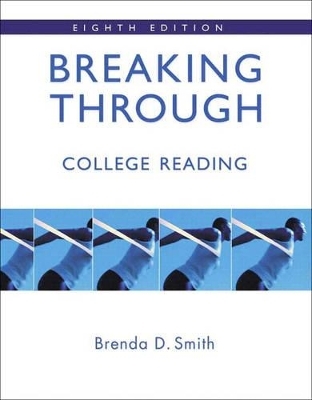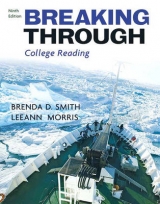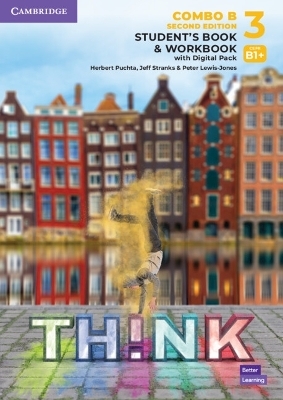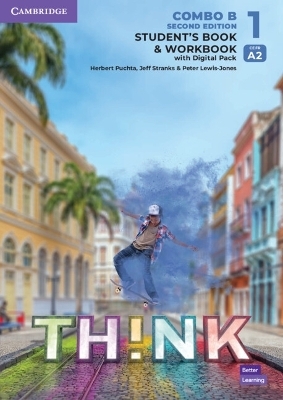
Breaking Through
Longman Inc
978-0-205-53823-2 (ISBN)
- Titel erscheint in neuer Auflage
- Artikel merken
A full textbook chapter, three selections per chapter, fourteen longer reading pieces, and two case books equip students with a wealth of opportunities to apply the skill being taught to reading short textbook passages and then go on to use multiple skills on the longer selections that conclude most chapters. As seen in “Reader’s Tips” boxes to focus on effective techniques for reading in different disciplines and the “Interpret the Quote” feature where students are asked to interpret a reading-opening quote based on the reading and their comprehension of the selection, students receive a wealth of support for academic success.
Chapter 1 Student Success Think Success
Set Goals
Create a Positive Attitude
Seek Excellence
READING 1 • SUCCESS STARTS SOMEWHERE
"Success Starts Somewhere"
from CEO of Self: You’re in Charge! by Herman Cain
Plan for Success
READING 2 • MAKING THE MOST OF PRIORITIES
from How to Get Control of Your Time and Your Life by Alan Lakein
Plan Your Week
Study the Syllabus
Use a Calendar to Decode a Syllabus
Act Successful
College Professor “Takes” American History
Attend Class
Be on Time for Class
Be Aware of Essential Class Sessions
Be Equipped for Success
Mark Your Text
Communicate with Your Instructor
Review Your Lecture Notes
Network with Other Students
Collaborate to Divide Work
Look at an “A” Paper
Use Technology to Communicate
Consider a Tape Recorder
Pass the First Test
Watch Videos or DVDs
Predict Exam Questions
READING 3 • BE POSITIVE
from I Feel Great AND You Will Too! by Pat Croce
SUMMARY POINTS
Everyday Reading Skills: Searching the Internet
Chapter 2 Stages of Reading
What Is the Reading Process?
Stages of Reading
Stage One: Previewing
Stage Two: Integrating Knowledge
Stage Three: Recalling
Assess Your Progress as a Learner
Levels of Reading Comprehension
SUMMARY POINTS
SELECTION 1 • HEALTH
“IMPROVED EATING FOR THE COLLEGE STUDENT”
from Health: the Basics by Rebecca Donatelle
SELECTION 2 • SCIENCE
“THE GALVESTON DISASTER”
from Oceanography: An Invitation to Marine Science by Tom Garrison
SELECTION 3 • BUSINESS
“THE DISNEY APPROACH TO GUEST SERVICE”
from Introduction to Hospitality by John R. Walker
VOCABULARY LESSON: Not, Not, and Not
Everyday Reading Skills: Reading News and Feature Stories in the
Newspaper
Chapter 3 Vocabulary
Learning New Words
Remembering New Words
Use Association
Use Concept Cards
Practice Your New Words
Unlocking the Meaning of New Words
Use Context Clues
Use Knowledge of Word Parts
Use the Glossary and the Dictionary
Types of Context Clues
Definition
Elaborating Details
Elaborating Examples
Comparison
Contrast
Multiple Meanings of a Word
Word Parts
Roots
Prefixes
Suffixes
The Dictionary
Guide Words
Pronunciation
Spelling
Word Meaning
Parts of Speech
Word History
Word Origins
Etymology
Textbook Glossary
Thesaurus
Analogies
Easily Confused Words
Enriching your Vocabulary
SUMMARY POINTS
VOCABULARY LESSON: For or Against?
Everyday Reading Skills: Getting News from Web Sites and Forums
Chapter 4 Main Idea
What Is a Main Idea?
Recognize General and Specific Words
Recognize General and Specific Phrases
Recognize the General Topic for Sentences
Recognize General and Supporting Sentences
Differentiate Topic, Main Idea, and Supporting Details
Differentiate Distractors in Main Idea Test Items
Questioning for the Main Idea
1. Establish the Topic
2. Identify the Key Supporting Terms
3. Focus on the Message of the Topic
Stated Main Ideas
Unstated Main Ideas
Getting the Main Idea of Longer Selections
SUMMARY POINTS
SELECTION 1 • PSYCHOLOGY
“SLEEPING AND DREAMING”
from Psychology: What It Is/How to Use It by David Watson
SELECTION 2 • SHORT STORY
“SHATTER PROOF”
by Jack Ritchie, from 100 Malicious Little Mysteries
SELECTION 3 • HISTORY
“THE DREAM OF NONVIOLENT REFORM”
from From These Beginnings by Roderick Nash and Gregory Graves
VOCABULARY LESSON: Before and After
Everyday Reading Skills: Selecting a Book
Chapter 5 Supporting Details and Organizational Patterns
What Is a Detail?
Recognize Levels of Importance
Distinguish Major and Minor Details
Follow Detailed Directions
Patterns of Organization
Simple Listing
Classification
Definitions with Examples
Description
Time Order, Sequence, or Narration
Comparison and Contrast
Cause and Effect
SUMMARY POINTS
SELECTION 1 • PSYCHOLOGY
“BECOMING HEALTHY”
from Psychology: Introduction to Human Behavior by Morris Holland
SELECTION 2 • CRIMINAL JUSTICE
“CONFIDENCE GAMES MAY BE A SHELL GAME SCENE”
from Criminal Investigation by Charles Swanson, Neil Chamelin, and Leonard Territo
SELECTION 3 • HISTORY
“LET THEM EAT CAKE”
from Civilization in the West by Mark Kishlansky, Patrick Geary, and Patricia O’Brien
VOCABULARY LESSON: One Too Many
Everyday Reading Skills: Selecting Magazines
ReadingCasebook 1: What Is Beauty?
Beauty Inventory 1
SELECTION 1 • LETTERS OF OPINION
“ALL THAT GLITTERS IS GOLD”
by Maureen Dowd, in the New York Times
SELECTION 2 • ESSAY
“EXTREME MAKEOVER”
from Morality Play by Jessica Pierce
SELECTION 3 • BUSINESS
“EVERYDAY WOMEN”
by Stuart Elliott, in the New York Times
Beauty Inventory 2
Chapter 6 Textbook Learning
Expect Knowledge to Exist
Annotating
When to Annotate
How to Annotate
Notetaking
When to Take Notes
How to Take Notes
Summarizing
When to Summarize
How to Summarize
Outlining
When to Outline
How to Outline
Mapping
When to Map
How to Map
Take Organized Lecture Notes
SUMMARY POINTS
SELECTION 1 • HEALTH
“BEHAVIOR CHANGE” 000
from Health: The Basics by Rebecca Donnatelle
SELECTION 2 • BUSINESS
“GOYA FOODS”
by Alejandro Bianchi and Gabriel Sama in the Wall Street Journal, and from the Goya
Web site
SELECTION 3 • COMMUNICATION
“EYE COMMUNICATION”
from The Interpersonal Communication Book by Joseph A. DeVito
VOCABULARY LESSON: See, Hear, and Voice Your Concerns
Everyday Reading Skills: Reading Reference Materials
Chapter 7 Test-Taking Strategies
Achieve Your Highest Potential
Be Prepared
Stay Alert
Seek Feedback
Standardized Reading Tests
Read to Comprehend
Interact
Anticipate
Relax
Read to Learn
Recall
Understand Major Question Types
Main Idea Questions
Detail Questions
Implied Meaning Questions
Purpose Questions
Vocabulary Questions
Hints for Taking Multiple-Choice and True-False Tests
Read All Options
Predict the Correct Answer
Avoid Answers with “100 Percent” Words
Consider Answers with Qualifying Words
Do Not Overanalyze
True Statements Must Be True Without Exception
If Two Options Are Synonymous, Eliminate Both
Figure Out the Difference Between Similar Options
Use Logical Reasoning When Two Answers Are Correct
Look Suspiciously at Directly Quoted Pompous Phrases
Simplify Double Negatives by Canceling Out Both
Certain Responses Are Neither True Nor False
Validate True Responses
Recognize Flaws in Test Making
Hints for Taking Essay Exams
Reword the Statement or Question
Answer the Question
Organize Your Answer
Use a Formal Writing Style
Be Aware of Appearance
Predict and Practice
Notice Key Words
Write to Earn Points
Read an “A” Paper for Feedback
SUMMARY POINTS
VOCABULARY LESSON: Call Out and Remember to Send
Everyday Reading Skills: Using Mnemonics
Chapter 8 Efficient Reading
What Is Your Reading Rate?
What Is an Average Reading Rate?
How Can You Increase Your Reading Speed?
Be Aggressive–Attack!
Concentrate
Stop Regressions
Avoid Vocalizations
Expand Fixations
Use a Pen as a Pacer
Preview Before Reading
Set a Time Goal for an Assignment
Be Flexible
Practice
SUMMARY POINTS
TIMED READING 1 • BUSINESS
“WHEN INTERVIEW QUESTIONS TURN ILLEGAL”
from Interviewing for Success by Arthur H. Bell and Dayle M. Smith
TIMED READING 2 • PSYCHOLOGY
“DR. FOSSEY AND THE GORILLAS”
from Psychology by Stephen Worchel and Wayne Shebilske
TIMED READING 3 • HISTORY
“ELEANOR ROOSEVELT”
from From These Beginnings by Roderick Nash and Gregory Graves
Everyday Reading Skills: Managing Workplace Reading
Chapter 9 Analytical Reasoning
Identify Analytical Thinking
An Unsuccessful Student
A Successful Student
Engage in Problem Solving
Analytical Reasoning in Textbooks
SUMMARY POINTS
SELECTION 1 • SCIENCE
“PROFILE OF A HURRICANE”
from The Atmosphere by Frederick Lutgens and Edward Tarbuck
SELECTION 2 • SOCIOLOGY
“GENDER AND SOCIAL INSTITUTIONS”
from Social Problems by John J. Macionis
SELECTION 3 • BUSINESS
“MOTIVATING YOURSELF”
from Your Attitude is Showing by Elwood N. Chapman
VOCABULARY LESSON: Turn and Throw
Everyday Reading Skills: Reading Direct Mail Advertisements
ReadingCasebook 2: What Is Forgiveness?
Forgiveness Inventory 1
SELECTION 1 • ESSAY
“FORGIVE FOR GOOD”
from Forgive for Good by Fred Luskin
SELECTION 2 • HISTORY
“THE STORY OF TOM TATE”
from The Forgiveness Project Web site
SELECTION 3 • NEWSPAPER ARTICLE
“PUSHING PAST THE TRAUMA TO FORGIVENESS”
by Robin Finn, in the New York Times
Forgiveness Inventory 2
Chapter 10 Inference
What Is an Inference?
Inference from Cartoons
Recognizing Suggested Meaning
Connecting with Prior Knowledge
Recognizing Slanted Language
Drawing Conclusions
SUMMARY POINTS
SELECTION 1 • SHORT STORY
“THE BEST PLACE”
by A. F. Oreshnik, from 100 Malicious Little Mysteries
SELECTION 2 • LITERATURE
“THE ALCHEMIST’S SECRET”
by Arthur Gorden
SELECTION 3 • SHORT STORY
“A DEAL IN DIAMONDS”
by Edward D. Hoch, from 100 Malicious Little Mysteries
VOCABULARY LESSON: Come Together, Hold Together, and Shut
Everyday Reading Skills: Reading Newspaper Editorials
Chapter 11 Critical Reading
What Do Critical Readers Do?
Recognize the Author’s Purpose or Intent
Recognize the Author’s Point of View or Bias
Recognize the Author’s Tone
Distinguish Fact from Opinion
Recognize Valid and Invalid Support for Arguments
SUMMARY POINTS
SELECTION 1 • LITERATURE
“THE DINNER PARTY”
by Mona Gardner, from Sudden Twists: 18 Tales that Take a Surprising Turn
SELECTION 2 • ETHICS
“COSMETIC SURGERY FOR PETS”
from Morality Play: Case Studies in Ethics by Jessica Pierce
SELECTION 3 • ESSAY
“WE’LL GO FORWARD FROM THIS MOMENT”
by Leonard Pitts, MiamiHerald
VOCABULARY LESSON: Bend, Born, and Body
Everyday Reading Skills: Evaluating Internet Information
Chapter 12 Independent Textbook Assignment
Apply What You Have Learned
INDEPENDENT ASSIGNMENT SOCIOLOGY
“THE POOR”
from Social Problems by John J. Macionis
Appendix 1 Sample Textbook Chapter
Appendix 2 Pronunciation Review
Appendix 3 Spelling Confusing Words
Appendix 4 Word Parts: Prefixes, Roots, and Suffixes
Appendix 5 ESL: Making Sense of Figurative Language and Idioms
Glossary
Acknowledgments
Index
Progress Record for Reading Selections
| Erscheint lt. Verlag | 30.8.2007 |
|---|---|
| Verlagsort | New Jersey |
| Sprache | englisch |
| Maße | 216 x 276 mm |
| Gewicht | 1279 g |
| Themenwelt | Schulbuch / Wörterbuch ► Wörterbuch / Fremdsprachen |
| Geisteswissenschaften ► Sprach- / Literaturwissenschaft ► Sprachwissenschaft | |
| ISBN-10 | 0-205-53823-1 / 0205538231 |
| ISBN-13 | 978-0-205-53823-2 / 9780205538232 |
| Zustand | Neuware |
| Haben Sie eine Frage zum Produkt? |
aus dem Bereich



